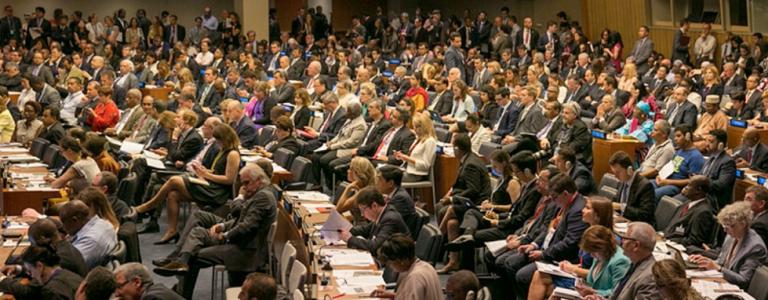HLPF Recap: The world's report card on global goals
Couldn’t travel to the High-Level Political Forum on Sustainable Development (HLPF)—or even if you could, couldn’t be in every side event at once? IISD has you covered.
Couldn’t travel to the High-Level Political Forum on Sustainable Development (HLPF)—or even if you could, couldn’t be in every side event at once? IISD has you covered.
News from the HLPF
IISD’s trusted reporting sources covered all angles, participants and parallel events during the two-week gathering in New York:
- Earth Negotiations Bulletin coverage of the official sessions of HLPF – Check out the photos for each day and the final summary, with our signature cutting-edge analysis of the event. Our writers evaluate the HLPF 2018 experience, asking: “Are we the species monitoring our own extinction rather than doing something about it?”
- SDG Knowledge Hub coverage of HLPF – Stories on expert group meetings and reports leading up to the HLPF, along with summaries of selected side events and other happenings in and around UN Headquarters in New York during the HLPF. How do experts recommend monitoring interlinkages among the SDGs?
- ENB+ – Summaries and videos of selected HLPF side events, as well as videos that capture the HLPF experience.
Side Events Featuring IISD’s Work and Experts
IISD staff shared recent work from our programs at a number of side events during the HLPF, participating in the rich exchange of ideas, tools and methodologies for evaluating Sustainable Development Goal (SDG) implementation and identifying options for how to move forward on this integrated, universal agenda.
SDGs 1, 7 and 12 | Leadership on Fossil Fuel Subsidy Reform for Sustainable Energy Access and Poverty Reduction
This side event was organized by New Zealand on behalf of the Friends of Fossil Fuel Subsidy Reform (“Friends”), with Finland, Switzerland, Sweden and Norway as co-organizers. IISD's Global Subsidies Initiative coordinated the discussion on lifting people out of energy instability, during which Anna Zinecker, IISD, launched a new report titled Getting on Target: Accelerating Energy Access through Fossil Fuel Subsidy Reform.
SDGs 11 and 17 | Unlocking the Potential of Communities with Data Dashboards
IISD organized this side event in cooperation with the Canadian Mission to the UN, where four North American communities—Hawai’i, New York, British Columbia and Winnipeg—shared how data visualization is helping them achieve the SDGs. A summary of the event is here.
SDGs 12 and 16 | Sustainable Strategic Public Procurement: Can the State be a Role Model for Sustainable Consumption?
IISD’s President and CEO, Scott Vaughan, moderated this side event on how government can use its buying power to advance sustainability. It was chaired by the Parliamentary State Secretary in the Federal Ministry for the Environment, Nature Conservation and Nuclear Safety, Germany.
SDGs 16 and 17 | Supporting Integrated Implementation of the SDGs: Tools for Addressing SDG Connections and Enhancing Policy and Institutional Coherence
Lynn Wagner, Group Director, SDG Knowledge Program, presented IISD’s SDG Knowledge Hub and the Sustainable Asset Valuation (SAVi) tool for analyzing the costs of externalities of infrastructure projects. Watch the full event here.
There was Still More:
IISD's Lynn Wagner joined with Canadian stakeholder groups and government representatives to discuss working together for Canada's newly launched SDG implementation plan and to launch Alliance 2030.
After the HLPF concluded, Lynn Wagner attended a two-day meeting on Contributions of Supreme Audit Institutions to the Sustainable Development Goals (SDGs) and moderated the discussion on stakeholder expectations and perspectives on the Supreme Audit Institutions’ contributions to the SDGs. A summary of the event is here.
You might also be interested in
What Drives Investment Policy-makers in Developing Countries to Use Tax Incentives?
The article explores the reasons behind the use of tax incentives in developing countries to attract investment, examining the pressures, challenges, and alternative strategies that exist.
What Is the NAP Assessment at COP 29, and Why Does It Matter?
At the 29th UN Climate Change Conference (COP 29) in Baku, countries will assess their progress in formulating and implementing their National Adaptation Plans. IISD’s adaptation experts Orville Grey and Jeffrey Qi explain what that means, and what’s at stake.
How to Track Adaptation Progress: Key questions for the UAE-Belém work programme at COP 29
UAE-Belem work program at COP 29: Emilie Beauchamp explains the complexity behind these talks and unpacks seven key questions that negotiating countries should address along the way.
COP 29 Must Deliver on Last Year’s Historic Energy Transition Pact
At COP 29 in Baku, countries must build on what was achieved at COP 28 and clarify what tripling renewables and transitioning away from fossil fuels means in practice.
